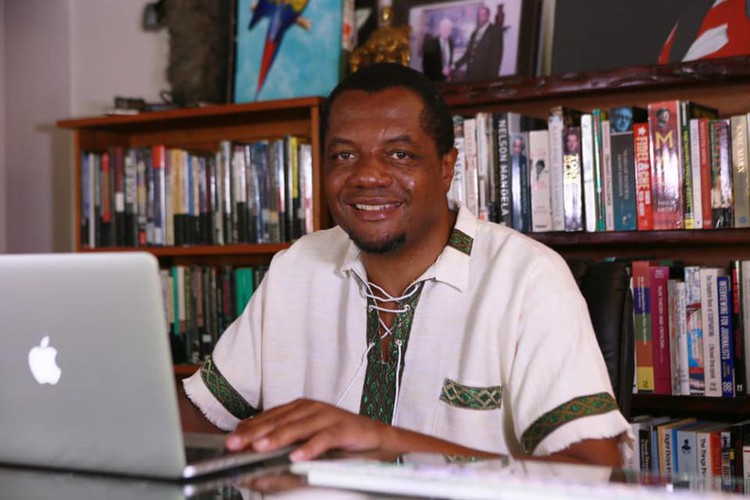
17 August 2021
Hopewell Chin’ono. Photo via Facebook.
Zimbabwean journalist Hopewell Chin’ono had to deliver the keynote address at the recent 23rd Nat Nakasa Awards remotely. He was unable to attend the event in Johannesburg because the Zimbabwean state has retained his passport. He has been hounded by the state for his exposure of high level corruption in ZANU-PF and has spent months in jail in various stints since 2020. GroundUp interviewed him this week.
You returned to Zimbabwe after many years abroad. Why did you return? What were your ambitions journalistically and your hopes for the country?
I returned from Britain having stayed there for ten years. I returned because at that time I was a youth and wanted to contribute towards the building of my country and specifically the building of the journalism industry. I had spent years in Britain studying and had gained experience at the BBC and thought it important for someone like myself to come back home and contribute. The hopes that l had for my country was that the leadership that was in power then and is still in power would allow young people to contribute towards building our country.
How has journalism in Zimbabwe changed in this past decade?
Journalism in Zimbabwe has never really changed over the years. For instance we only have one state owned television station which has been there since 1960. It has been the only one and there has not been any other television station to compete with it. It has made it difficult for television journalism to develop. We are now sadly the only country in Africa which has only one TV station. Change has only come through social media which l use and it has allowed us the platform to disseminate ideas and information without any limitations.
Has the State’s attitude to the media changed since President Emmerson Mnanagagwa replaced Robert Mugabe? And how?
The state’s attitude towards the media has not changed since Mugabe left because it is the same people that are in charge. It is the same ruling party [ZANU-PF] that is in charge. What only changed was the removal of Mugabe by his friends. Otherwise things have become worse in terms of the relationship between the state and journalism in general.
Journalists in South Africa are increasingly targeted via social media. Is this also the case in Zimbabwe?
Journalism is a difficult space to operate in. Yes, journalists are targeted on social media in Zimbabwe. I am always targeted by the president’s spokesperson, spokesperson for the government, ZANU-PF trolls. They insult us and spread lies about us but there’s nothing we can do because it’s part of the game. Social media is accessed by everyone and because of this there’s always going to be a lot of vitriol thrown at us especially through ghost accounts. And they hide behind anonymity so you never know who is behind that nastiness.
Can you share with us a few of the stories that you think have got you into the most trouble?
The stories that got me in trouble are exposure of corruption, looting of public funds, the plunder of the country’s natural resources.
Last year, l exposed a looting scandal of Covid-19 funds. Whilst I was doing so, the ruling party held a press conference and accused me of insulting the family of the president because some family members were named in there. Immediately after that l was arrested and l spent 45 days in Chikurubi maximum prison. The charge that they used is a trumped up charge of incitement, which is still over my head.
When l got arrested for the second time it was for exposing that the president’s niece was going to get bail unopposed. That again is a charge which is still hanging over my head.
The third time l was arrested, on 8 January, was for something I didn’t even do, and they used a law that does not even exist.
So you see, if you are arrested for things you haven’t done it shows how terrible Zimbabwe is for Journalism. But we have to persevere because it is our country and it’s our profession to tell the truth and hold those in power to account.
Please describe the current media landscape in Zimbabwe as you see it.
It is terrible it’s difficult to operate in Zimbabwe. Journalists are scared that they will be arrested like what happened and continues to happen to me. They are afraid that they might be killed like what happened to Itai Dzamara. Zimbabwe is a terrible space for practising journalism. So l have a lot of respect for those who’ve stayed and those who continue to do serious journalism.
What are the first key steps needed to free up the press in Zimbabwe?
We need reforms. These reforms are very simple. The government just needs to follow the constitution and allow citizens who are journalists to practice their craft without hindrance, without intimidation, without state institutions being used against them.
How can people outside Zimbabwe help?
They have to keep the voice, by amplifying our voices. They need to speak out each time journalists in Zimbabwe are arrested.